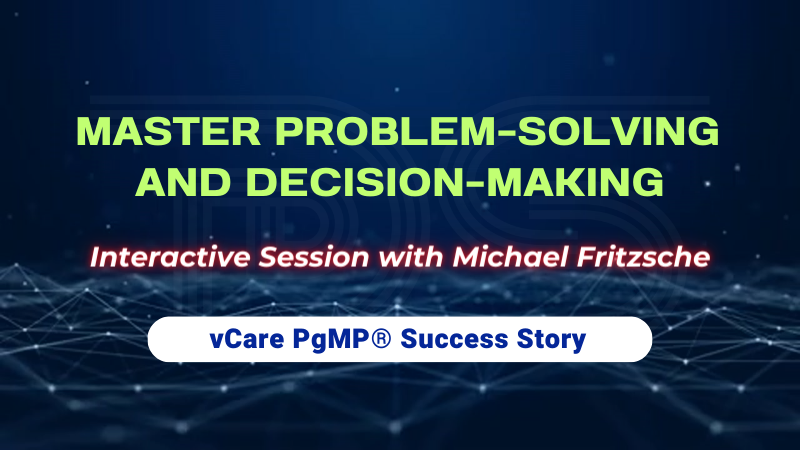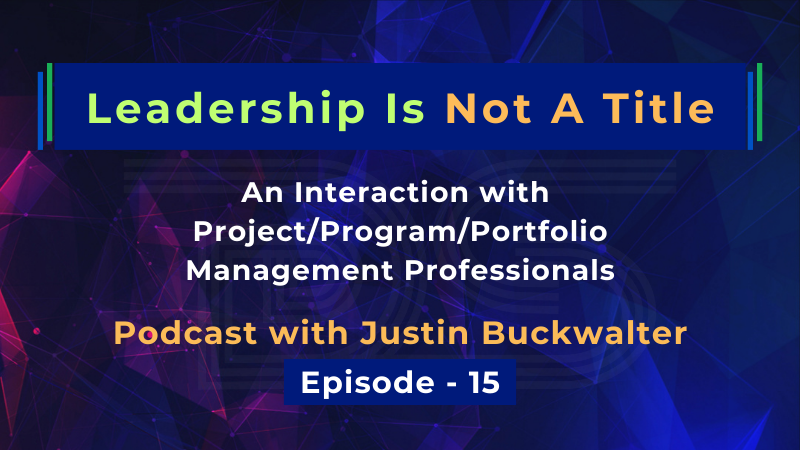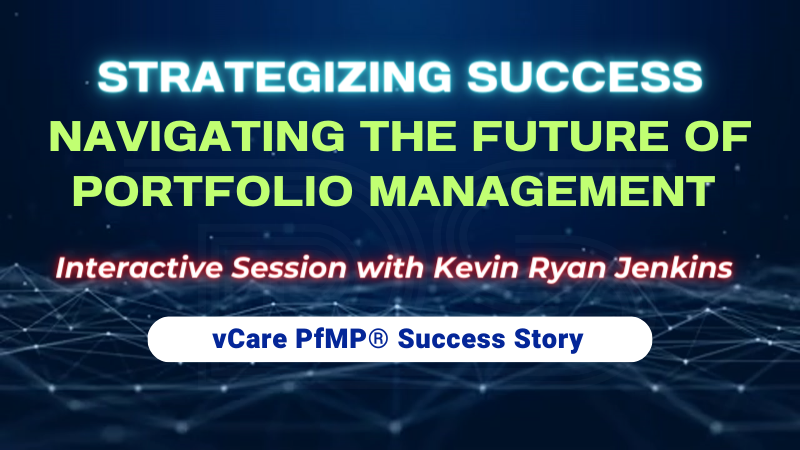
by DharamCW | May 12, 2024 | Leadership in Project Management
Master Problem-Solving and Decision-Making | vCare PgMP Success Story | Michael Fritzsche | Dharam
🔑 Highlights of the session include:
– Charting New Horizons: vCare’s Journey to Empowering 500 PgMP Leaders Worldwide
– How can your senior managers and leadership team be equipped to make better strategic decisions? And what tools can your organization utilize to compete effectively in a competitive marketplace?
– Why do people trust human judgment over algorithms? And how do anger poison decision-making and problem-solving mindset?
– What are the best decision-making practices for building stakeholder trust and credibility?
– How can you use deadlines to increase your productivity?
– AI and project management at Hahn
– How algorithms help in decision making vs Human Judgement?
– Which decision should be taken when labour resists to work, what should an executive do? Take action against him or compromise?
– Can you please explain more about predictive project management?
– How can project managers effectively balance data-driven decision-making with the need for human judgment and intuition?
– Could you talk about, how to best manage up in a conflict?
– How is the emotional intelligence of a team taken into consideration in critical highly sensitive programs embracing AI?
🚀 Elevate Your Project Management Career:
– Register for my upcoming PgMP/PfMP Success Story Webinars: https://bit.ly/4aVhrd6 / https://bit.ly/4aycVBj
– Book an obligation-free consultation session on Project management Career, training, and certifications: http://talktodharam.com
– Discover training offers and certification discounts: https://bit.ly/3jWVepD
– Stay updated with our Q&A series and certification success stories by subscribing to the vCare Project Management YouTube channel at https://bit.ly/2YF0wJl
– Follow my podcasts and interviews with Project Management Experts on YouTube at https://bit.ly/2NDY8wd
PgMP4U – http://bit.ly/2SBPwIp
PfMP4U – http://bit.ly/31P7GKR
PMP4U – https://bit.ly/30gV5QX

by DharamCW | May 8, 2024 | Leadership in Project Management
Leadership Is Not A Title | Justin Buckwalter | Dharam Singh | Episode 15
In this insightful episode, Justin Buckwalter, PfMP, PgMP, PMP, PMI-ACP, PMI-RMP joins me in trying to dismantle the conventional views on leadership. We delve into why leadership should be seen as a behavior, not just a role. Through a compelling discussion, we have highlighted how anyone can embody leadership by influencing positively and initiating change, irrespective of their position.
Discussion Points:
+ Leadership as Action: Why it’s about what you do, not your title.
+ Essential Traits of True Leaders: What makes a leader stand out?
+ Universal Leadership: The importance of fostering leadership at every level.
+ Leadership SWOT Analysis: A tool for crafting achievable development goals.
+ Conflict Management: Techniques for leaders to navigate workplace challenges.
+ Cultivating Inclusivity: Strategies to nurture a welcoming, diverse work culture.
+ Motivation vs. Power Misuse: The dual-edged impact of leadership influence.
Join us to explore how effective leadership transcends titles and becomes a part of the organizational fabric, empowering all to contribute meaningfully.
🚀 Seize the opportunity to Elevate Your Project Management Career:
– Register for my upcoming PgMP/PfMP Success Story Webinars: https://bit.ly/4aVhrd6 / https://bit.ly/4aycVBj
– Book an obligation-free consultation session on Project management Career, training, and certifications: http://talktodharam.com
– Discover training offers and certification discounts: https://bit.ly/3jWVepD
– Stay updated with our Q&A series and certification success stories by subscribing to the vCare Project Management YouTube channel at https://bit.ly/2YF0wJl
– Follow my podcasts and interviews with Project Management Experts on YouTube at https://bit.ly/2NDY8wd

by DharamCW | May 5, 2024 | Professional Development Webinars
Strategizing Success: Navigating the Future of Portfolio Management | Kevin Ryan Jenkins | 1 PDU | vCare PfMP Success Story
Join me for an enlightening webinar with K. Ryan Jenkins , Senior Vice President at Taylors International Services, Lehi, Utah, United States. Kevin is a seasoned Business Development and Portfolio Management expert with extensive experience in the food and beverage service industry. He also has a strong background in military logistics and team management.
This webinar will cover, among many, the below topics:
– Strategic Role of Portfolio Management: Discuss how portfolio management defines organizational direction and aligns with program execution.
– Overcoming Organizational Silos: Strategies for using a portfolio mindset to ensure strategic execution and successful project delivery.
– Technological Disruptions and Portfolio Management: Adjusting strategies to leverage technological advancements, focusing on the impact of AI.
– Portfolio Management in a Volatile Global Context: Strategies to maintain competitiveness in fluctuating political and economic conditions.
– AI and Portfolio Management: Exploring how AI revolutionizes portfolio management to enhance project success rates.
This session will enhance your understanding of portfolio management and allow you to earn 1 PDU as an added benefit.
🔗 Reserve your spot now: https://bit.ly/4aycVBj
Session Date & Time:
Thursday, 16th May 2024
10:30 AM – 11:30 AM (PDT) / 11:30 AM – 12:30 PM (MDT) / 12:30 PM – 01:30 PM (CDT) / 01:30 PM – 02:30 PM (EDT) /02:30 PM – 03:30 PM (BRT) / 06:30 PM – 07:30 PM (BST) / 07:30 PM – 08:30 PM (CEST) / 08:30 PM – 09:30 PM (AST) / 09:30 PM – 10:30 PM (GST)
🚀 Elevate Your Project Management Career:
– Book an obligation-free consultation session on Project Management Career, training, and certifications: http://talktodharam.com
– Discover training offers and certification discounts: https://bit.ly/3jWVepD
– Stay updated with our Q&A series and certification success stories by subscribing to the vCare Project Management YouTube channel at https://bit.ly/2YF0wJl
– Follow my podcasts and interviews with Project Management Experts on YouTube at https://bit.ly/2NDY8wd

by DharamCW | May 1, 2024 | Program Management
Factors Influencing Project Economy | Navigating the Complexities of the Project Economy
In this insightful episode, join Thomas Walenta and me as we delve into the evolving dynamics of the project economy. Here’s what you’ll discover:
+ Demographic Shifts: Strategies for project managers to adapt to changing demographics effectively.
+ Climate Resilience: Integrating climate change considerations into your project planning.
+ Technological Advancements: Embracing AI and its transformative impact on projects.
+ Globalization Effects: Managing remote teams and cultural diversity in projects.
+ Geopolitical Tensions: Navigating the complexities of global trade and political challenges.
These discussions are brimming with practical insights designed to empower project leaders like you to navigate these challenges with confidence and strategic acumen.
🚀 Embrace the chance to Advance Your Project Management Career:
– Register for my upcoming PgMP/PfMP Success Story Webinar: https://bit.ly/3TSx8fj
– Book an obligation-free consultation session on Project management Career, training, and certifications. Get personalized advice and guidance tailored to your career goals: http://talktodharam.com
– Discover training offers and certification discounts: https://bit.ly/3jWVepD
– Stay updated with our Q&A series and certification success stories by subscribing to the vCare Project Management YouTube channel at https://bit.ly/2YF0wJl
– Follow my podcasts and interviews with Project Management Experts on YouTube at https://bit.ly/2NDY8wd









Recent Comments